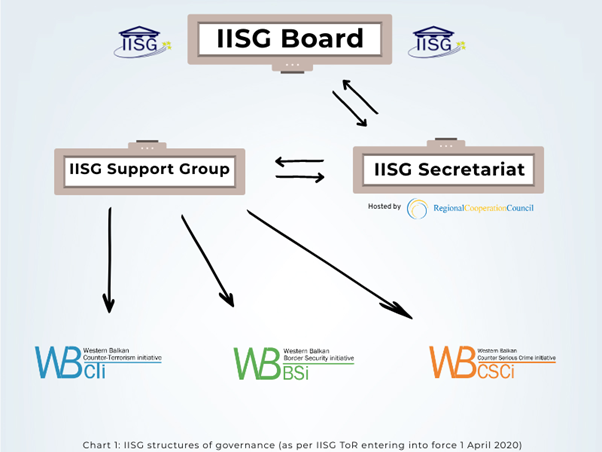The IISG (Integrative Internal Security Governance) process has been initiated as part of the EU’s decisive action to improve cooperation with the Western Balkans region on security issues. The concept enables a coordinated, aligned, and sustainable effort in the major fields of internal security governance reform on part of the EU and all relevant international donors of external assistance. The process has progressively developed and has been endorsed at the level of the Justice and Home Affairs Council in the form of Council Conclusions. The IISG was endorsed by the Council of the EU in late 2016, and officially launched by the ministers of interior/security of the Western Balkan countries in September 2017 at the IISG Kick-Off Conference – Brdo Process Ministerial Meeting at Brdo pri Kranju, Slovenia, supported by the IPA funded DCAF project on “Support to P/CVE in the Western Balkans”.
As announced during the 4th IISG Board Meeting, the RCC (Regional Cooperation Council) will become the host of a new IISG Secretariat as of 1 April 2020. IISG was merged with and under the RCC which will coordinate one of the most important agendas of the region: security. The RCC is a regionally-owned and led cooperation framework operating under the auspices of the Southeast European Cooperation Process (SEECP), addressing the issue of security since its inception in 2008 as one of its pillars of action in support to regional cooperation and Euro-Atlantic integration process of the SEE region.
The IISG process, which aims to improve collective efficiency of security actions and actors in the Western Balkans, can be an important contributor to better collective security action and as such support the European perspective of the region.
Governance of the IISG:
The IISG is composed of three bodies: the IISG Board, the IISG Secretariat and the IISG Support Group.

Structure of the IISG:
The IISG is organised in the following three thematic pillars:
- The WBCTi (“Western Balkans Counter-Terrorism Initiative”): actions related to counter-terrorism and preventing and countering violent extremism;
The Western Balkan Counter-Terrorism initiative (WBCTi) is an EU-supported effort to respond to the developments related to Terrorism, Violent Extremism and Radicalisation phenomena in the Western Balkans by maximizing the potential of Regional Cooperation policy and by merging the efforts of all relevant security actors in this area of policy development in an efficient and sustainable manner. - The WBCSCi (“Western Balkans Counter Serious Crime Initiative”): actions related to fighting serious organised crime;
The Western Balkan Counter-Serious Crime initiative (WBCSCi) is the second pillar of the IISG (Integrative Internal Security Governance) in the Western Balkans; an effort to respond to the threats of Serious and Organized Crime in the Western Balkan region by merging the efforts of all relevant security actors, EU and international donors of external assistance in this area of policy in an efficient and sustainable manner. - The WBBSi (“Western Balkans Border Security Initiative”): actions related to border security.
The Western Balkan Border Security initiative (WBBSi) is the third pillar of the IISG (Integrative Internal Security Governance) in the Western Balkans; an effort to respond to the threats to border integrity of the Western Balkan region by merging the efforts of all relevant security actors, EU and international donors of external assistance in this area of policy in an efficient and sustainable manner.
Objectives of the IISG:
The objective of the IISG is to improve collective efficiency by mapping needs and coordinating responses concerning security threats in the Western Balkan region. For this purpose, the IISG is a coordination platform bringing together relevant international partners, Western Balkans partners, EU actors and EU Member States in the areas of counter-terrorism, organised crime and border security, in line with the EU perspective for the region.
Core tasks of the IISG:
The core tasks of IISG are to:
- map the security needs in the Western Balkans region in the areas of counter-terrorism, organised crime and border security;
- map ongoing projects, activities, initiatives (“actions”) conducted, in the first place, by IISG members from a regional perspective. On this basis develop and disseminate to the relevant stakeholders a comprehensive and regularly updated overview;
- analyse whether the needs are adequately addressed, to prevent duplications and gaps in responses, and to suggest and facilitate potential synergies;
- collect and communicate achievements in order to ensure their visibility.
